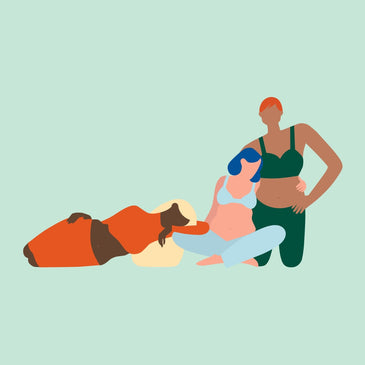Bodily does not provide medical advice, diagnosis, or treatment. The resources on our website are provided for informational purposes only. You should always consult with a healthcare professional regarding any medical diagnoses or treatment options.
What is it?
Constipation — or difficulty moving your bowels — is common in the postpartum period, particularly in the first few days after giving birth. Regardless of how you delivered your baby, postpartum bowel movements can be painful — with a vaginal delivery because of perineal tearing, and with a cesarean birth, because you’ve just had major abdominal surgery.
How common is postpartum constipation?
Constipation is very common. Its causes include:
- Stretched abdominal muscles
- Sluggish bowels from pain medication
- An empty stomach after not eating during labor
- Forceps delivery
- Prolonged second stage of labor
- Higher child birth-weight
(The last two instances can cause an anal sphincter injury resulting in postpartum constipation)
How long does it last?
Constipation is most common in the first few days postpartum. But studies suggest that many women experience constipation for three to six months postpartum. In some cases it may even persist for up to 12 months following delivery.
What can be done to remedy it?
When constipation is a struggle, these things can help:
Stay hydrated
Drinking a lot of water can help keep things moving. Eat foods that have high water content, such as watermelon, cucumbers, salads and soups. And avoid salty foods and caffeinated drinks, which are diuretics that can leave you dehydrated.
Increase fiber
Consume foods with soluble fiber like prunes, pears, apples, apricots, cherries, nectarines, peaches, plums and watermelon — all of which contain sorbitol. Also eat insoluble fibers, or bulk-forming laxatives, like bran, psyllium, methylcellulose and flaxseeds, which can be added to yogurts, shakes and salads. Soluble and insoluble fibers work well together: Soluble fiber causes water to be pulled into the colon, helping to soften stool and move things along. Bulk-forming foods increase the water content and weight of the stool, which — when combined with light activity or walks — can help to facilitate a bowel movement.
Take stool softeners
Colace is an over-the-counter stool softener that lubricates stools, making it easier for them to pass. Try to avoid softeners with stimulants as they can decrease nutrient absorption if used too often.
Where can you find it
Try magnesium
Studies show that magnesium citrate increases the amount of water in the intestinal tract, which can promote bowel movements. A doctor or midwife can help determine whether you should take it and at what dosage.
Optimize your position on the toilet
Placing your feet on a footstool while going to the bathroom can make it easier to pass stools without straining.
How can I prevent it?
You can reduce the severity of postpartum constipation by staying hydrated and eating high-fiber foods in the weeks before labor and delivery. Also, make sure to do light exercise to keep things moving and have stool softeners on hand before you need them.
When should I be worried?
Constipation accompanied by constant pain, severe bloating and vomiting is cause for concern. Contact your OB/GYN or midwife immediately if you are experiencing these symptoms.




